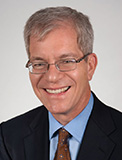Talking About Foreign Service Advocacy
President's Views
BY ROBERT J. SILVERMAN

Advocating for the Foreign Service in Congress and the American public over the past year has taught me some lessons. One is to focus on the positive—here is what the Foreign Service brings to the foreign policy table, and here is why the diverse and skilled women and men of the Foreign Service should be at the center of our policymaking and execution.
Perhaps in a prior generation that sort of advocacy was unnecessary. But I do feel that in today’s globalized American society, with dozens of NGOs, businesses and think-tanks producing cadre with international savvy, the Foreign Service must make its case to the public. To strengthen that advocacy, we must look inward to sharpen our tools and keep our profession current.
Conversations with colleagues have surfaced two concepts along these lines that I want to share with you.
Information Dominance. One way for Foreign Service members to lead—for instance, to prevail in a debate over policy X in country Y—is for that person to know more about X and Y, and how other U.S. government operations interact with them, than anyone else.
A colleague with plenty of National Security Council experience calls that information dominance, and she sees a need for more Foreign Service people to adopt the concept. It shouldn’t imply being overbearing or aggressive—just having the relevant knowledge and the good sense on when to deploy it.
Service in country and taking an FSI course are necessary but quite insufficient to achieve information dominance. Here is an example. I used to sit in Near Eastern Affairs Bureau meetings next to an FSO named Alberto Fernandez who took detailed notes—in Arabic. He went on to reach an extraordinary level of fluency, and deployed it in media interviews that established his pre-eminence in that difficult language.
My advice is to seek appropriate opportunities to acquire the highest possible level of expertise in areas of interest for current and future assignments, to go beyond what the State Department can provide through personal investment of time and energy.
This level of expertise, along with strong leadership and interpersonal skills, is key to the “wow” factor of the top Foreign Service cadre.
A New Career Track for Expeditionary Diplomacy. In May I wrote about the Groundhog Day experience of reliving our nation-building interventions, without learning from past experiences, from Vietnam and Bosnia to Iraq and Afghanistan. That led to a conversation with several colleagues about how one might institutionalize in the Foreign Service the skills needed to be successful in these situations.
One idea we discussed was seeking to establish a new career track or cone for expeditionary diplomacy. True, we are reducing the presence of provincial reconstruction teams in Afghanistan and Iraq. But the need for volunteers to serve in similar situations is present elsewhere—for instance, in Syria and South Sudan—and the need for expeditionary diplomacy skills isn’t going away.
What skills? They involve the ability to work in fluid situations without a strong central host government or U.S. embassy infrastructure to promote the local government’s rule of law, reconstruction and economic development, and delivery of services.
Different in nature from the work of the other FS cones and skill codes, expeditionary diplomacy is more akin to the work of the U.S. military’s civil-military affairs or the United States Institute for Peace’s post-conflict reconstruction.
This Foreign Service discipline would require intensive interagency leadership training. The homes for it already exist in State’s Conflict and Stabilization Operations Bureau and USAID’s Office of Transition Initiatives.
The main purpose of establishing this new track would be to deepen the Foreign Service’s expertise in critical areas for the U.S. national interest. It would demonstrate Foreign Service leadership in hardship environments through a sustainable institutional framework.
Willingness to lead in the toughest places would also resonate with the American public and strengthen our advocacy.

